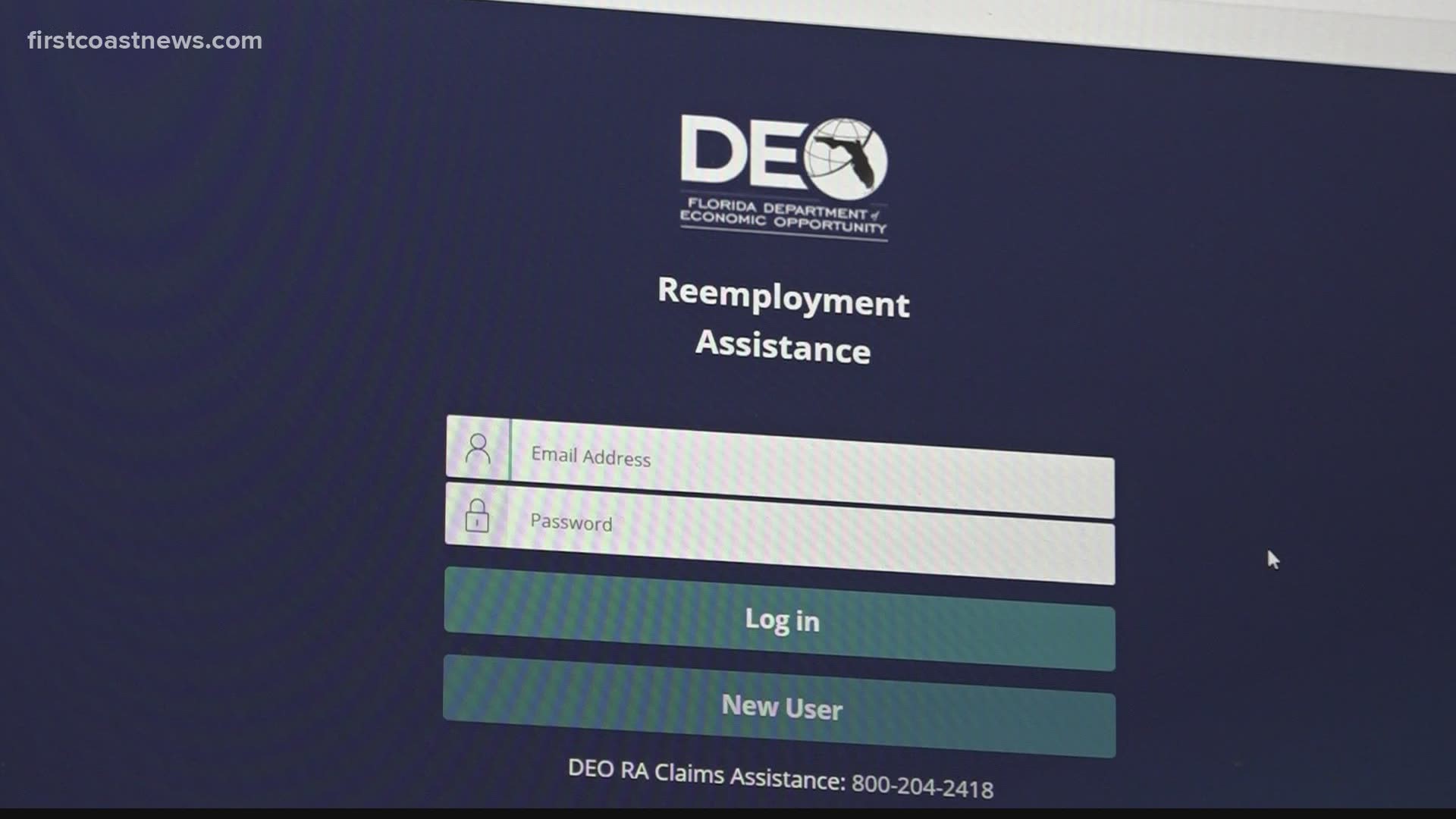JACKSONVILLE, Fla — While a majority of Floridians have yet to receive an unemployment check, some waiting for more than a month and a half, the state's unemployment trust fund was the only in the nation to increase in funds in March and April.
Since a surge of claims due to COVID-19 job loss began in mid-March, colossal failures within the Florida Department of Economic Opportunity's claims system have consistently stymied the state's efforts to get people paid.
As the speed of pay outs remained low, documents show the fund from which benefits are paid actually gained money.
"As of mid-April, only four or five percent of claims had been processed," said Michele Evermore, a senior researcher and policy analyst at the National Employment Law Project. "Some benefits paid out in April, but the reality is receipts were greater than outlays. They've gotten more money in than benefits paid out."
Employers pay into a state's trust fund in the form of a payroll tax, Evermore said. More employees utilizing the trust fund means employers pay more into the fund, which can also accrue interest through federal securities.
"The average employer in Florida pays just 50 dollars a year per employee into the state unemployment trust fund," Evermore said.
RELATED: Unemployment Maze: Floridians left without answers, some deemed 'ineligible' after weeks of waiting
Evermore said that at the start of 2020, Florida's trust fund was "solvent," meaning it would be able to pay out in an average one year recession period. But this is not an average recession.
"Even states that are solvent are probably going to run out of money before the end of the downturn," she said.
But as of the most recent reports available through the U.S. Department of the Treasury, Florida's trust fund had gained nearly $17 million dollars between the start of March and April 16, the last day of data available.
For the purposes of comparison, trust funds in California and New York each lost about $1.2 billion during the same time frame. The trust fund in Texas lost about $500 million, and Louisiana's lost more than $80 million.
In fact, Florida is the only state with a trust fund that increased during that time, receiving money from payroll taxes and interest on federal securities.
"Florida is the only state where the trust fund gained money over the course of the crisis," Evermore said. "It means Florida is slower to pay benefits than any other state."
RELATED: Unemployment Maze: Here's what you should do next if you were deemed 'ineligible' for state benefits
Meanwhile, there are still a number of claims filed in March that remain in a seemingly endless "pending" loop.
Jacksonville chef Desmond Leonard-Cohen finds himself in this boat after applying more than a month and a half ago. He said he has yet to receive any claim-specific info from FDEO.
"You have to be incompetent to disregard something that people are in dire need of," he said. "I mean all these words, all these emotions rattle through me every time I get on the website or see a press conference saying nothing."
As of Tuesday evening, there are more than 1.7 million unemployment claims in the mix at FDEO. Of those, just over one million have been confirmed as unique claims, meaning there are no duplicates.
The state has processed more than 735,000 claims and has paid more than 478,000 claimants. But FDEO has not told First Coast News how many of those claimants have been paid in full, and many people who have written are saying they are only receiving a portion of their benefits.
A whopping 282,671 Floridians have been deemed "ineligible" for state benefits and have been advised to apply for federal benefits called Pandemic Unemployment Assistance (PUA).
Still, many have reached out to say they should not have been denied. I've heard from a number of people who have been in the same full-time jobs for years, unable to understand how they don't qualify for state benefits.
But the state so far is sticking behind the "ineligible" determinations, saying claims may lack all the needed info. And while spokespeople for FDEO say those deemed "ineligible" are being contacted with reasons why, many of those we have spoken to say they have heard nothing.
Leonard-Calhoun said daily attempts to get claim-specific information for weeks on end eventually took a toll on his mental health to the point where he had to step back.
He returns to work Wednesday, without a dime in benefits from the state.
"The whole system, in itself, is incompetent," he said. "I was spending upwards of eight to ten hours every day trying to reach someone and understand what's going on."
Evermore said it will take a massive, collective effort by Floridians to push for change and demand system improvements to prevent this kind of crisis from happening again.
"There were political decisions made to make this a difficult system to access," she said. "Not giving any thought to what's going to happen when there's another recession."
On Monday, Governor Ron DeSantis announced that the state's inspector general will be tasked with investigating what went wrong at FDEO. Senator Rick Scott, formerly Gov. Scott, has not responded to our request for an interview.

